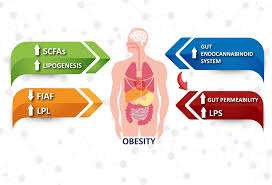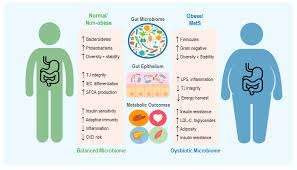We often hear about how diet and exercise are vital in managing body weight, but one aspect that is less discussed and equally crucial is the state of our gut.
Yes, your gut – the trillions of tiny bacteria and other microorganisms that live in your digestive tract.
As per leanandfit.info, “These microbes are collectively known as the gut microbiome, and their role goes far beyond breaking down food. They have a direct influence on your weight, and when you’re dealing with obesity, the balance of your gut microbial diversity gets thrown off”.
So, how does this happen, and what can be done about it?
“How Obesity Alters Gut Microbial Diversity” Article Index:
- Introduction to the Gut Microbiome: A Miniature World Inside You
- Obesity and Gut Microbial Diversity: What Changes Happen?
- Daily Lifestyle Examples: How Everyday Habits Affect Your Gut
- The Role of Gut Bacteria in Weight Gain
- Scientific Evidence: The Gut-Obesity Link
- Conclusion: Restoring Gut Health for Better Weight Management
Introduction to the Gut Microbiome: A Miniature World Inside You
So, what exactly happens to your gut when you’re obese?
One of the key shifts is a reduction in microbial diversity.
This means that the range of beneficial bacteria that thrive in your gut shrinks, while certain harmful bacteria start to dominate.
For example, the types of bacteria that thrive on fiber, such as those from the Bacteroidetes family, decrease in people with obesity.
At the same time, bacteria that thrive on fat and sugar, such as those from the Firmicutes family, become more prevalent.
Studies have shown that individuals with obesity have a higher ratio of Firmicutes to Bacteroidetes than lean individuals.
This shift does not just affect digestion; it also influences how your body processes and stores energy, leading to more fat accumulation.
Imagine a garden overrun with weeds. When diversity is lost, the “weeds” – in this case, harmful bacteria – take over, and the beneficial plants – the good bacteria – struggle to survive.
The same is true in your gut. A diet heavy in processed foods and low in fiber creates the perfect environment for these harmful bacteria to flourish, tipping the scales toward weight gain.
Daily Lifestyle Examples: How Everyday Habits Affect Your Gut?
Our daily habits play a huge role in shaping our gut microbiome. Let’s break down a typical day for many people.
A Typical Breakfast Example:
You might grab a muffin and a coffee loaded with sugar and cream.
While this may seem like a convenient option, it is setting your gut up for failure. This is a classic example of poor nutrition.
The sugars in that muffin fuel harmful bacteria, like Firmicutes, that thrive on processed sugars and fats.
These bacteria not only multiply but also extract more calories from your food, leading to weight gain.
A Typical Lunch Example:
Fast food like burgers and fries are not just calorie bombs; they are microbiome disruptors.
A low-fiber, high-fat diet has been shown to significantly reduce gut microbial diversity, further feeding the bacteria that contribute to fat storage and inflammation.
A Typical Dinner Example:
Let us say you end your day with a pre-made microwave meal.
These highly processed foods lack the necessary nutrients to support a diverse microbiome.
Over time, diets rich in processed foods and low in natural, fiber-rich options (think vegetables, fruits, and whole grains) lead to a decrease in beneficial bacteria.
By contrast, a diet rich in diverse, plant-based foods promotes the growth of beneficial bacteria that thrive on fiber.
For instance, starting your day with oatmeal and berries, having a hearty salad with beans for lunch, and a stir-fry packed with vegetables for dinner will fuel the “good” bacteria, allowing them to flourish.
This kind of diverse diet can help prevent the imbalance that contributes to gut bacteria causing weight gain.

The Role of Gut Bacteria in Weight Gain
Here’s where it gets even more interesting: certain gut bacteria are more efficient at extracting calories from food and storing them as fat.
Studies show that people with obesity have a different gut microbial makeup than those of normal weight, with bacteria that are better at extracting calories from food. In other words, even if two people eat the same diet, the one with an imbalanced microbiome (common in those with obesity) may store more fat from the same amount of food.
In one fascinating study, researchers transferred the gut bacteria from obese humans into germ-free mice.
Despite eating the same diet, the mice with the “obese” gut bacteria gained significantly more weight than those with a healthy, diverse microbiome. This experiment shows just how powerful the gut microbiome obesity connection can be.
Essentially, certain strains of gut bacteria may be influencing your body to store more fat, making it harder to lose weight.
Moreover, gut bacteria can affect your hormones, particularly those involved in hunger and satiety.
Harmful gut microbes can produce chemicals that influence your brain to crave unhealthy foods, contributing to overeating and making it more difficult to control your weight. This also increases stroke risk.
In this way, your gut bacteria can literally drive you to consume more of the foods that feed them, creating a vicious cycle of weight gain and microbial imbalance.
Scientific Evidence: The Gut-Obesity Link
Scientific research strongly supports the connection between gut microbes and obesity.
>>> For instance, a landmark study published in Nature found that obese individuals tend to have less diverse gut bacteria compared to lean individuals.
>>> Another study in Cell demonstrated that microbial diversity is directly linked to metabolic health, with those having a lower diversity of gut microbes experiencing higher levels of obesity, insulin resistance, and chronic inflammation.
One of the most striking pieces of evidence comes from studies on the gut microbiome and weight gain in animal models.
>>> In a study published in The Journal of Clinical Investigation, researchers showed that gut bacteria from obese individuals increased fat storage in animals, even when the animals were fed the same diet as their lean counterparts.
This suggests that altering the gut microbiome could potentially be an avenue for microbiome obesity treatment in humans as well.
>>> Further research published in Nature Reviews Microbiology has pointed to specific strains of gut bacteria, such as Akkermansia muciniphila, which are associated with lean body types.
This beneficial bacterium helps to maintain the gut lining, reduce inflammation, and promote fat metabolism.
In contrast, the depletion of these helpful bacteria in obesity worsens the problem, promoting fat accumulation and inflammation.
FAQs on Gut Microbial Diversity and Obesity
Q-1: Does obesity simply change the Firmicutes/Bacteroidetes ratio—or does diversity shift in subtler ways?
A-1: The old phylum-ratio story is too simple. In obesity, strain-level changes matter more: loss of niche specialists that feed on diverse plant fibers, and expansion of generalists that thrive on easily digested, ultra-processed carbs and fats. The net effect is lower “alpha diversity” (fewer types per person) and a community that’s less resilient to stressors like illness, travel, or antibiotics.
Q-2: How does body fat itself push the microbiome toward a pro-inflammatory profile?
A-2: Visceral fat releases cytokines that loosen gut barriers and alter motility. Slightly leakier junctions let more microbial fragments reach immune cells, which then favor bacteria that tolerate inflammation. Over time, mucus-loving degraders may overgrow while butyrate-producing neighbors shrink, nudging the gut toward irritation, slower repair, and blunted satiety signaling.
Q-3: Why do people with obesity often show “flatter” day–night microbiome rhythms—and why does that matter?
A-3: Irregular sleep and late eating dampen microbial diurnal cycles. Many species normally “clock in” to help process breakfast fats or evening starches; when timing gets chaotic, those handoffs fail. Flatter rhythms mean less efficient bile-acid recycling, more post-meal endotoxin exposure, and a persistent sense of sluggish digestion—felt as heavier meals and longer “food hangovers.”
Q-4: How do bile acids link high-fat patterns in obesity to lower microbial diversity?
A-4: High-fat, low-fiber diets expand a detergent-heavy bile pool in the intestine. Some microbes are bile-tolerant and bloom; others are sensitive and recede. Because bile acids also signal through FXR/TGR5 to tune glucose and lipid handling, the microbial reshuffle feeds back into metabolism: fewer fiber-fermenters, altered short-chain fatty acid balance, and less support for gut barrier integrity.
Q-5: Can diversity rebound—and what changes move the needle fastest?
A-5: Yes, but it’s about consistency more than one superfood. Fast movers include: (1) 30+ plant types per week (count herbs, nuts, pulses, whole grains), (2) “fiber first” meal structure so microbiota-accessible carbs hit the colon daily, (3) fermented foods rotation (e.g., yogurt/kefir, kimchi, tempeh), (4) earlier eating window to restore microbial rhythms, and (5) steady sleep/wake anchors. Many people notice easier digestion and steadier energy within weeks; diversity and stress resilience follow with months of repetition.
Restoring Gut Health for Better Weight Management
So, to answer the question: how does obesity alter gut microbial diversity?
The changes are dramatic and detrimental.
Obesity reduces the diversity of your gut bacteria, tilting the balance in favor of harmful microbes that extract more calories from food and promote fat storage.
This disruption to your gut’s ecosystem does not just make weight loss harder, it also contributes to inflammation, insulin resistance, and metabolic dysfunction.

The solution lies in restoring the balance.
Fortunately, it is possible to support a healthier gut microbiome through diet and lifestyle changes.
A diet rich in fiber from whole foods like vegetables, fruits, legumes, and whole grains promotes a diverse microbiome and supports the growth of beneficial bacteria.
Fermented foods like yogurt, kefir, and kimchi are also excellent for increasing your gut’s microbial diversity.
Additionally, reducing your intake of processed foods, sugars, and unhealthy fats can starve the harmful bacteria that thrive on these foods.
By making these changes, you can begin to shift the balance back toward a healthier gut, making weight management easier and supporting overall health.
In short, while gut bacteria fat gain might be working against you, you can turn the tide by feeding your body and your microbiome the nutrients they need to thrive. For example, I always consume healthy smoothie recipes for weight loss to keep my weight in check.
The connection between the gut microbiome and obesity is complex but not irreversible.
Taking steps to improve your gut health will not only aid in weight loss but also help prevent the chronic diseases linked to obesity.
References:
